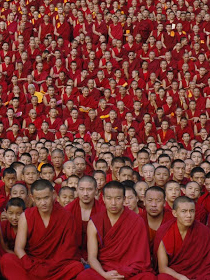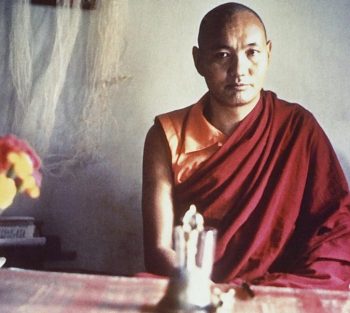If your daily life is tremendously involved in emotions, you are completely driven by them and psychologically tired. You have to learn to sit back instead of being impelled by your emotions. Emotions aren’t necessarily negative—they can be positive too—but in the Western environment, when we relate with each other we get tremendously emotional. In other words, our physical emotions get too involved and we don’t understand the functioning of our six sense consciousnesses.
Buddhism has tremendous concern for the needs of both the object and the subject, and in this way, loving-kindness becomes an antidote to the selfish attitude. Western religions also place tremendous emphasis on love and compassion but they do not emphasize wisdom. Understanding wisdom is the path to liberation, so you have to gain it.
When I was in Spain with His Holiness the Dalai Lama, we visited a monastery and met a Christian monk who had vowed to stay in an isolated place. His Holiness asked him, “How do you feel when you experience signs of happy or unhappy things coming to you?” The monk said, “Happy is not necessarily happy; bad is not necessarily bad; good is not necessarily good.” I was astonished. To my small understanding, that was wisdom.
The person who has some understanding of emptiness will have exactly the same experiences as that monk. The person sees that bad and good are relative; they exist for only the conditioned mind and are not absolute qualities. The characteristic of ego is to project fantasy notions onto yourself and others, and this is the main root of problems. You then react emotionally and hold your pleasure and your pain as concrete. You can observe right now how your self-image is simply a projection of your ego. It’s a simple question: “How does my mind imagine myself?” Understanding your conventional mind and the way it projects your own self-image is the key to realizing emptiness. In this way you break down the gross concepts of ego and eradicate the self-pitying image of yourself. By eliminating the self-pitying imagination of ego, you go beyond fear. All fear and other self-pitying emotions come from holding a self-pitying image of yourself.
You can also see that you feel the self-pitying image of yourself that you had yesterday still exists today. That is wrong. Thinking, “I’m a very bad person today because I was angry yesterday; I was angry last year” is also wrong, because you are still holding today an angry, self-pitying image from the past. The ego holds a permanent concept of our ordinary self all the time—this year, last year, the year before: “I’m a bad person; me, me, me, me, me, me.” From the Buddhist point of view, if you hold that kind of concept throughout your lifetime, you will become a bad person because you interpret yourself as a bad person. Therefore, your ego’s interpretation is unreasonable. It has nothing whatsoever to do with reality. And because your ego holds onto such a self-existent I, attachment begins. From the Buddhist point of view, it is very difficult for a person to experience non-attachment. From the Buddhist philosophical point of view, attachment for something means that it is very difficult for us to separate from it. We have a very strong attachment, strong like iron, for the things we think of as being very good. We need to learn to be flexible.
Let’s look at a flower. My attachment for the flower is a symptom. It shows that I overestimate the value of the flower. I wish to become one with the flower and never separate from it for the rest of my life. You understand how sick I am? It is so difficult for me to let go of it. This craziness is attachment. But non-attachment is flexible; it is a middle way, a reasonable way.
The psychology of attachment is overestimation; it is an unrealistic attitude. That is why we are suffering; and for that reason Buddhism emphasizes suffering, suffering, suffering. Westerners can’t understand why Buddhism talks about suffering so much. “I have enough money. I can eat. I have enough clothes. Why do you say I’m suffering? I’m not suffering. I don’t need Buddhism.” This is a misunderstanding of the term “suffering.” Attachment itself is suffering.
Philosophically, you can research emptiness very deeply; you can analyze the notion of the self-existent I a thousand ways. However, I am talking about what you can do practically, every day, right now. Don’t think about Buddhist terminology; don’t think about what the books say or anything like that. Just ask yourself simply, “How, at this moment, do I interpret myself?” That’s all. Each time you ask yourself that question you get a different answer. Then you can laugh at yourself: “What I’m thinking is incredible!” But you shouldn’t worry; just laugh. The way you question yourself should make you laugh. In that way, you get closer to emptiness. Because you know through your own experience that your own projection of yourself is a fantasy and, to some extent, you experience selflessness. You no longer trust your own ego and your concepts become less concrete.
This type of analytical meditation shouldn’t make you sad or serious. When you really understand something, you can laugh at yourself. Of course, if you are alone, you shouldn’t laugh out loud too much, otherwise people will think you’re clinically sick! Milarepa is a good example. He stayed alone in the snowy mountains and laughed and sang to himself. He laughed because his life was rich and happy.
Your entire life is built by dualistic concepts. Actually, “dual” means two, but in Buddhism, our complaint is not that two phenomena exist. The problem is their contradictory, competitive nature. Is the competitive mind comfortable or not? Is the competitive life comfortable or not? Is competitive business comfortable or not? The mind is irritated. The mind in which there are two things always contradicting each other is what we call the dualistic mind. Simply put, when you get up in the morning after a good night’s sleep, do you feel peaceful? Yes, you feel peaceful. Why? Because during sleep, the dualistic mind is at rest! As long as the dualistic mind is functioning in your life, you are always irritated; you have not attained the peace of ultimate reality.









